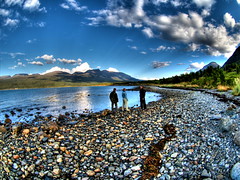Galvanize 1. b: to stimulate or excite as if by an electric shock
-(merriam-webster)

News out of Canada today still lacks in-depth information and examination, but so far what is coming out is that a same sex couple who got married back in 2005, while trying to get a divorce, were told by the Canadian government that their marriage had never been legal. The British-American couple was shocked at this revelation, and according to the Toronto Star (newspaper) the same applies to thousands of other same sex marriages between non-Canadians that have taken place in Canada since 2004.
If you remember back to 2004, it was the height of same-sex marriage phobia in the United States, and the re-election of George W. Bush. Americans, as well as people from all over the world who could manage it, went to Canada where the country had embraced its role as a nation where same sex marriages could be legally performed and recognized. The government even used this image, as they do to this day, as part of their promotion of Canada as a world leader in human rights. The reports that have surfaced this week indicate that government lawyers are now arguing in court that if same sex marriages aren’t legal in the home country of those getting married, then the marriage isn’t legal in Canada either.
In the coming days the government as well as the lawyers may change their story. The prime minister, unsurprisingly, claims ignorance as to any change in government policy. But regardless of what elected officials, lawyers or the media say, this development should be enough to galvanize Canadians who value human rights and equal treatment. The spark that reawakens a movement that has, perhaps, fallen asleep to what seemed like mission accomplished. Suddenly betraying thousands of couples should be an electric shock that sweeps representatives out of office, and embarrasses lawyers and others into resignation and generally speaking – the social wilderness. This is the time to take something horrible and turn it into a rally cry to demand justice, a real, lasting justice that cannot be undone.
 “Do you fear an arms race over the arctic?” the host of The Current Podcast asked an Inuit representative during a recent episode. The gentlemen spoke at length about the problems of the Inuit population in the high arctic and his concerns about the Canadian federal government doing military exercises in the arctic as opposed to giving much needed attention to public services and infrastructure.
“Do you fear an arms race over the arctic?” the host of The Current Podcast asked an Inuit representative during a recent episode. The gentlemen spoke at length about the problems of the Inuit population in the high arctic and his concerns about the Canadian federal government doing military exercises in the arctic as opposed to giving much needed attention to public services and infrastructure.